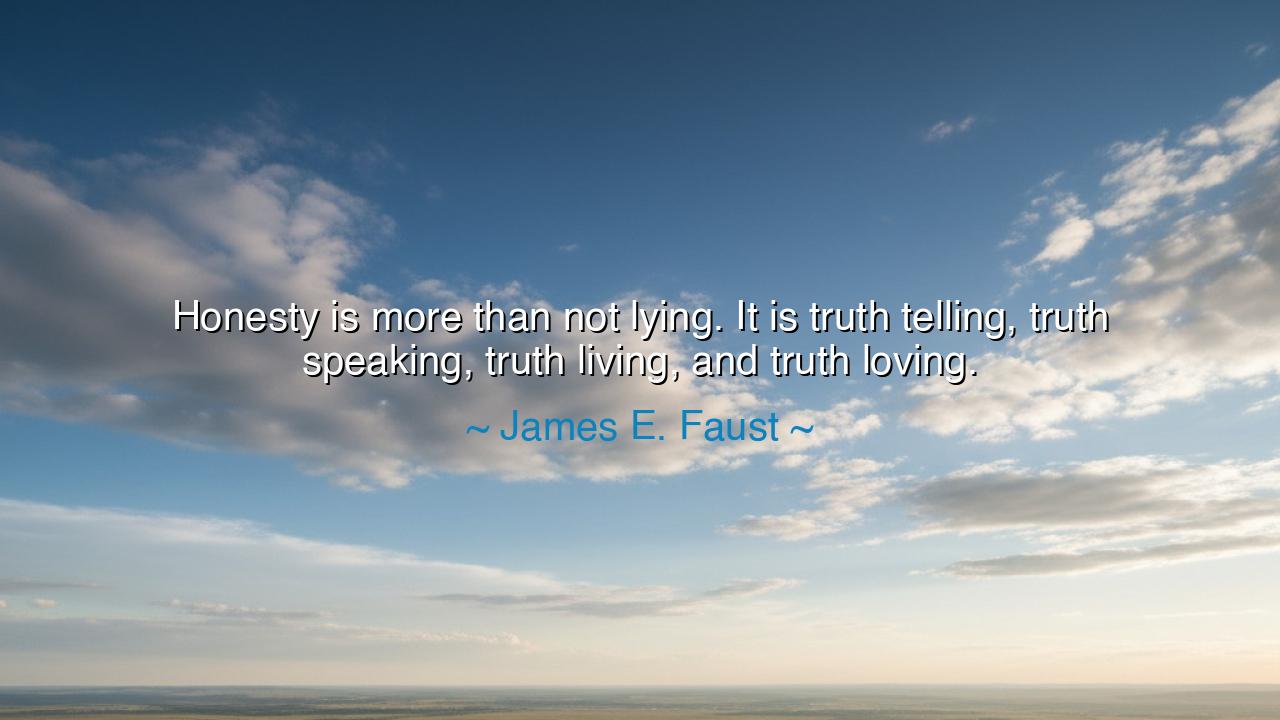
Honesty is more than not lying. It is truth telling, truth
Honesty is more than not lying. It is truth telling, truth speaking, truth living, and truth loving.






Hear the words of James E. Faust, who declared with piercing clarity: “Honesty is more than not lying. It is truth telling, truth speaking, truth living, and truth loving.” These are not words to be read lightly, for they cut deeper than the simple commandment “Do not lie.” They remind us that honesty is not merely the absence of deception, but the fullness of a life bound to truth in every thought, word, and deed. To refrain from lying is the beginning, but it is not the end; true honesty is an active force, a flame that burns steadily in the heart and illumines all that we do.
The meaning of these words is profound. Too many believe that so long as they avoid speaking outright falsehoods, they are honest. Yet silence can deceive, omission can betray, and half-truths can wound more deeply than lies. Faust teaches that honesty demands more: it is to tell the truth when asked, to speak the truth even when inconvenient, to live the truth in our daily choices, and even more, to love the truth, to cherish it as the foundation of freedom and integrity. Honesty is not passive restraint; it is active devotion to reality.
The ancients knew this well. Aristotle wrote of truthfulness as a virtue that stands between boastfulness and false humility, a harmony of word and deed. The Stoics taught that to live in accordance with nature was to live in accordance with truth, for falsehood corrupts the soul. In every age, wise men have known that honesty is not a single act, but a way of life—a weaving of truth into the very fabric of one’s being.
Consider the story of Abraham Lincoln, who was known even in his youth as “Honest Abe.” It was said that he once walked miles to return a few pennies to a customer he had mistakenly overcharged. Such an act may seem small, but it revealed something greater: a life lived in reverence for truth, even in little things. His honesty was not only in refusing to lie, but in embodying truth living and truth loving. That character, forged in simple acts of integrity, later gave him the strength to lead a fractured nation through its darkest trial.
Contrast this with those who build lives on falsehood. History shows us rulers and leaders who deceived their people, who masked cruelty with pleasant words, and who were eventually undone by their own lies. A kingdom of falsehood may flourish for a season, but it collapses when its foundation rots. Only those who live in truth loving endure, for truth alone stands against the winds of time.
What lesson, then, must we take? Be not content with avoiding lies; that is but the path of children. Strive instead to live as one who embodies honesty in its fullness. Tell the truth when silence would be easier. Speak the truth when the crowd demands flattery. Live the truth so that your actions align with your words. And above all, love the truth, so that your heart clings to it as a sailor clings to the mast in the storm. For if you love truth, you will never betray it, even when it costs you.
Therefore, O child of tomorrow, engrave these words upon your heart: honesty is more than not lying. It is a way of living in harmony with the eternal. Choose truth not only when convenient, but especially when costly. For in doing so, you will walk in freedom, you will inspire trust, and your life will shine as a lamp to others lost in the shadows of deceit. And when the winds of falsehood shake the world, you will remain unshaken, for you are rooted in the everlasting power of truth.






GHDoan Gia Han
I find Faust’s view of honesty inspiring because it challenges the common, limited view of honesty as just telling the truth. It seems like honesty should be a way of life, influencing everything we do, say, and think. But how do we balance this with the reality that sometimes, telling the full truth can hurt others or ourselves? Is there ever a time when being fully honest can be detrimental, or is truth always worth pursuing?
HNHong Nhung
Faust’s definition of honesty feels more holistic. It’s not just about what we say, but how we integrate truth into every aspect of our lives. Do you think this kind of honesty is idealistic, or is it something that can be realistically achieved? How does this level of commitment to truth impact relationships and society? Could it be that we fear such a deep level of honesty because of the vulnerability it brings?
NNNgoc Ngo
This quote makes me reflect on how honesty is often reduced to just not telling lies. But as Faust suggests, it’s much more profound. Living truthfully, speaking truthfully, and even loving truth requires a constant commitment. Do you think it’s possible to truly live with this level of honesty, or do people find themselves slipping into comfortable falsehoods? What would the world look like if everyone truly embodied this idea of honesty?
TDTu Duong
James E. Faust’s view of honesty really expands the concept beyond just avoiding lies. It’s about living in a way that fully embraces truth in all forms—thoughts, actions, and emotions. How often do we think of honesty only in terms of what we say, but not what we do or how we live? Can we be honest without being truthful in our actions and intentions? How do we cultivate a deeper sense of honesty in our daily lives?